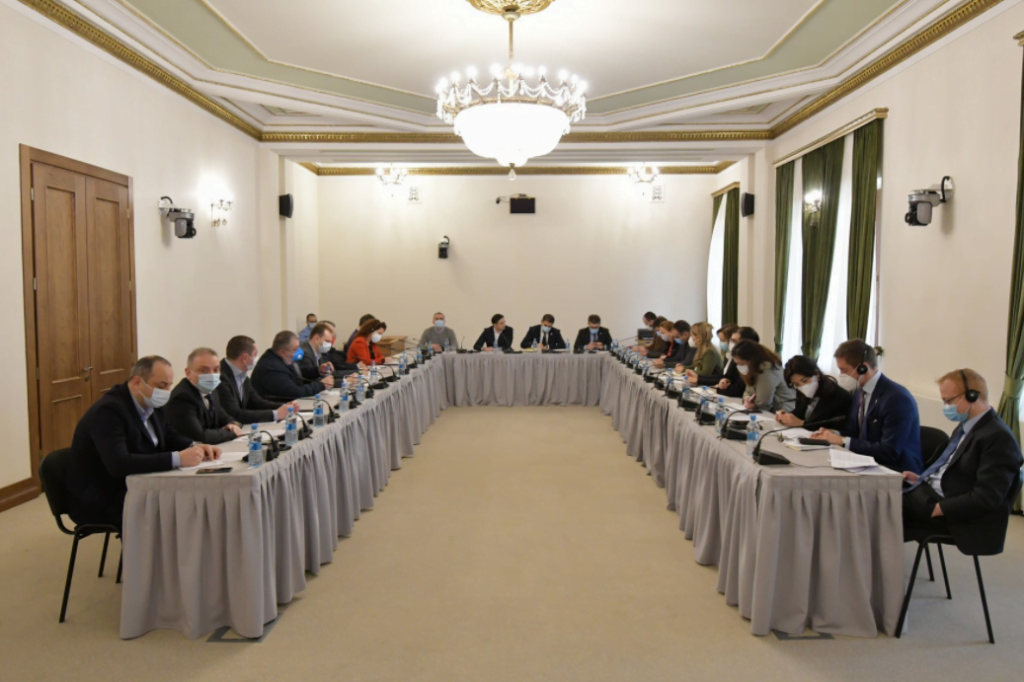The Parliament of Georgia on February 8 hosted the first meeting of the working group on electoral reform, co-chaired by ruling Georgian Dream (GD) party MP Shalva Papuashvili and MP Levan Ioseliani, freshly-elected Parliamentary Vice-Speaker from the Citizens’ party.
Georgian Dream and parliamentary opposition MPs, members of international organizations and local civil society outfits, including key election watchdogs, as well as Central Election Commission (CEC) representatives, attended the meeting.
According to the Georgian Parliament’s press service, the parties discussed the issues related to “the format, principles and future coordination” of the working group. A second meeting was scheduled for February 15.
The working group was established to implement the amendments proposed in the electoral reform deal struck by the ruling Georgian Dream party and the two Citizens’ MPs, Aleko Elisashvili and Levan Ioseliani, who decided on January 29 to defy the opposition boycott and enter the Parliament.
The deal envisages reforming the CEC composition, altering the procedure for CEC Chairperson election, introducing new election-technologies, reviewing norms on the use of administrative resources and election dispute resolution, as well as changing local elections rules.
Notably, according to the memorandum, the 2024 parliamentary election threshold will be set at no more than the current 5% and no less than 3%, a change that requires a constitutional majority vote (113 votes), currently unattainable because of the ongoing boycott by major opposition parties.
The working group, as per the electoral reform memorandum, must submit a bill to Parliament no later than March 1 and pass the amendments on May 1 at the latest.
The working group is comprised of 19 members: MP Shalva Papuashvili (Georgian Dream), MP Levan Ioseliani (Citizens), Davit Zilpimiani (European Socialists), Giorgi Sharabidze (CEC), Giorgi Javakhishvili (CEC), Giorgi Dzagania (CEC), Vakhushti Menabde (GYLA), Levan Natroshvili (TI Georgia), Nino Rizhamadze (ISFED), Arnold Stepanian (PMMG), David Ghonghadze (IFES), John Dipiro (IRI Georgia), Nino Dolidze (IRI Georgia), Alan Gillam (NDI Georgia), Evan Elliott (U.S. Embassy Tbilisi), Adam Schmidt (USAID/Georgia), Asunción Sánchez Ruiz (EU Delegation to Georgia), Irakli Kobalia (EU Delegation to Georgia), Maia Jorjikia (CoE).
Civil Society, Boycotting Opposition React
Civil society representatives who attended the meeting highlighted shortcomings in the proposed reforms afterwards. ISFED’s Nino Rizhamadze said the deal does not cover key issues related to vote-buying, as well as measures against misuse of administrative resources and the participation of civil servants in election campaigns.
TI Georgia’s Levan Natroshvili noted the memorandum in its current form poses a risk that Election Commissions will still be “under the influence of the ruling party.”
As the major opposition parties are still refusing to enter the Parliament, Salome Samadasvhili from the United National Movement said the Government “cannot create the illusion that an agreement with a single political player [Citizens party], especially the one with low electoral support, will defuse the political crisis.”
European Georgia party leader Giga Bokeria stated any kind of election reform must be coupled with snap elections, also claiming that the ruling party “did not receive legitimacy” in the October 31 parliamentary polls.
This post is also available in: ქართული (Georgian) Русский (Russian)

